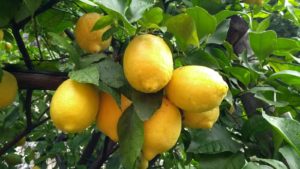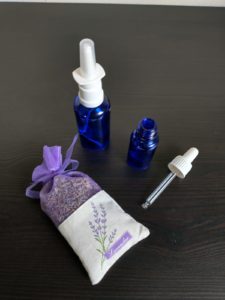Working group Eifel online – “essential oils in the cold season”.

24 February 2021 By Verena Grewenig
On 29.01.2021 the working group Eifel took place online due to the Corona requirements.
This gave the opportunity for all members of the association to participate in the working group.
So we were a big round of 25 international participants. The countries Belgium, Austria, Switzerland, Czech Republic and Germany were represented.
The topic of the evening was “essential oils in the cold season”.
Colds are caused by droplet infections of viruses (rhinoviruses, adenoviruses, coronaviruses and influenza viruses) and secondary infections by bacteria
Favouring factors for a cold
- Colds can occur at any time, but especially in winter
- Dry nasal mucosa, e.g. due to dry heating air, air conditioning or nasal spray abuse, which prevents the nose from fulfilling its cleansing function.
- In winter we spend a lot of time in closed rooms, often there is not enough ventilation.
- Frequent changes from warm to cold
Symptoms of a cold
- The nose runs
- Breathing through the nose is difficult due to swollen nasal mucous membranes.
- Earache due to a swollen Eustachi’s tube
- Dry, raw throat and irritation of the cough
- Fatigue
- Mild fever
- Headache and aching limbs
In this case, the oils of the following groups of active substances are used in particular:
- Oxides – e.g. ravintsara, cajeput, eucalyptus globulus, niauli, myrtle morocco, green lavender.
- Monoterpenes – e.g. lemon, sweet orange, silver fir, cypress, mountain pine, juniper
- Monoterpene aldehydes – lemongrass, litsea, lemon balm, lemon verbena, eucalyptus citriodora
- monoterpenols – e.g. lavender fine, linaloe wood, tea tree, thyme linalool, rose geranium, palmarosa
- Monoterpene phenols in low dosage – e.g. thyme thymol
Lavandula Viridis the green lavender also called lemon lavender (a still little known oil)
It is similar in appearance to the crested lavender, except that the flower is white and not purple, it comes from Portugal, grows wild in the Algarve, WD from flower rips and stem, appearance clear to yellowish, strongly fragrant, medicinal, eucalyptus-like, ingredients: 53.27 % 1.8 cineole, 2.24 % alpha-pinene, 0.39 % beta-pinene, and others.
Due to the high content of 1.8 cineol, this oil is conceivable in use for colds.
https://www.fontepenedo.com/aetherische-oele/lavandula-viridis-oel
Arachis hypogaea – peanut oil
It belongs to the legumes – Fanaceae, Leguminosae a subfamily of the papilionaceous plants – Faboideae. It is grown in India, Africa, USA, the oil is obtained by cold pressing of the dried nuts, the appearance is clear to yellowish and it smells typical of peanuts.
Ingredients: oleic acid approx. 42 – 62 %, linoleic acid approx. 24 – 43 %, palmilitic acid approx. 10 %, stearic acid approx. 4 %, behenic acid approx. 4 % fatty substances up to 1%, especially vitamin B1, D, E tocopherols, phytosterols, minerals

Good massage oil, absorbs very slowly into the skin, strongly refatting and it has a softening effect.
It is good for nasal care in dry nasal mucous membranes and softens bark and crusts. It educates better moisturizing than isotonic saline and thus can be decisive in restoring intact mucosal conditions. In addition, peanut oil can improve cilia beating frequency (beating frequency of the cilia of the nasal mucosa).
Even more information on peanut oil can be found in Aroma Report 20, main topic: “Native fatty vegetable oils II”.
Possible applications of essential oils and fatty plant oils as accompanying support for colds or for prophylaxis:
- Room scenting for room air disinfection and stimulation to active and through-breath
- Inhalation classically with hot water and towel or inhalation pens
- Bath/footbath to relax
- Rubbing with aroma care oil mixtures on the soles of the feet, axles, lymphatic channels, nostrils, chest and back.
- Gargle is also recommended by the German Hospital Association.
- https://www.krankenhaushygiene.de/pdfdata/2020_12_02_Empfehlung-viruzides-gurgeln-nasenspray.pdf
- Mouth and lip care, oil pulling, essential and fat plant oil prevent here the Quorum Sensing
- The two US microbiologists Professor Bonnie L. Bassler and Professor Michael R. Silverman will receive the prestigious Paul Ehrlich and Ludwig Darmstaedter Prize 2021, honoring Silverman and Bassler for their work on bacterial communication / quorum sensing.
- https://www.aerztezeitung.de/Medizin/Mikrobiologen-mit-Paul-Ehrlich-und-Ludwig-Darmstaedter-Preis-geehrt-416606.html
Info from the association
Presentation of the Aroma Report No. 23 “The Fire of Rosemary Oils”.
The date for the general meeting with board elections is planned for 26.06.2021 in the beautiful ambience of the perennial nursery Gaißmayer.
After the board election in the afternoon, the lawyer Dr. Reinhart will present the news of the legal basis for aromatherapy and aroma care.
06/27/2021 9:00 a.m. – 4:30 p.m. Health begins in the mouth! with Janine Sarah Klee, Perennial Gardener Gaißmayer, Natural, organic oral health with essential and fatty plant oils.
The aroma study trips to Bulgaria and South Tyrol are unfortunately canceled due to current reasons.
The next working group meeting is on 30.04.2021, 16:30 – 19: 00
Visit of the historical water mill in Birgel, Mühlenstraße 1, D-54587 Birgel/Vulkaneifel
Costs between 20-30 € per person, depending on the number of participants.
In case the attendance date cannot take place, we will hold the working group online again. The topic will be announced on the homepage shortly.
Verena Grewenig
Head of working group Eifel



No Comments